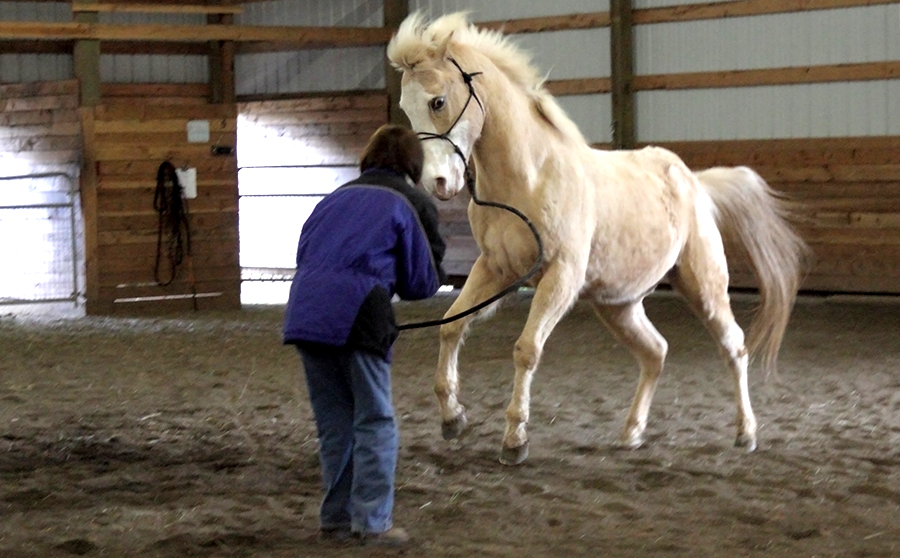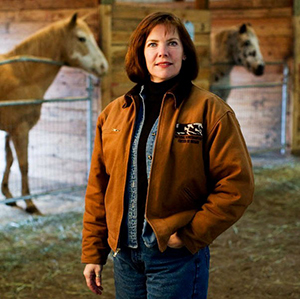
by Missy Wryn
Are you baffled by a sudden change in your horse’s behavior? Did it seem to come on suddenly, out of the blue with no warning? Is your horse trying to bite you or kick at you, or is he getting pushy or bucking for no apparent reason? Behavior changes in your horse can be baffling, frustrating and sometimes downright dangerous! If gone unaddressed horses can end up being abused, sold or even euthanized unnecessarily.
I have often been the last stop for a horse that is otherwise on their way to be auctioned or euthanized due to problem and dangerous behavior. In order to get to the source of the behavior, I have a lengthy intake process where the answers to my numerous questions are a road map to the source of the problem behavior. Here are some questions I ask that the answers can be very telling:
- When did you first notice the behavior change?
- Think back, was your horse trying to tell you something before the behavior became a problem?
- If so, in what way was your horse trying to tell you, for example little nips, pinny ears, cinchy, crow hopping?
-
Did you and/or your horse have an accident?
- If so what were the details?
-
Was there anything going on at the barn at the time the behavior changed?
- Did anything change in your horse’s environment i.e. did your horse lose a barn mate to moving or death?
- Has there been any change in feed or supplements?
- Has your horse ever had dental work?
- If so when was the last time?
- Were power tools used?
- Was sedation used and if so was it heavy or light?
- Did the dental specialist or veterinarian work with your horse’s head high in the air or did the specialist/vet work from their knees with your horse’s head down?
- If your horse is in a stall, how many hours a day does your horse spend in the stall?
- Does your horse pace, crib or have stall bound behaviors?
- What position in the herd is your horse with other horses?
- Does your horse get picked on?
As you go through this exercise don’t dismiss even the silliest thought that comes to mind, it may be a clue to unraveling your horse’s change in behavior; write down everything that you can think of.
After a thorough intake next is a body check:
- Look at your horse’s eyes.
- Are they tired looking or bright?
- Does your horse have furrows above the eyelids?
- Is there a worried look or does your horse look wide eyed and panicky?
- Does your horse get panicked over certain situations, for example having to go out to pasture with other horses?
- Gently and slowly run your thumb down the side of your horse’s neck and down the back.
- Is there any flinchy skin, swishy tail, pinny ears or does your horse try to nip you? Repeat this on the other side and make any notes of resistant behavior.
- Gently run your thumb along the ribs and around the girth, and make note of any flinchy, swishy tail or behavior that is otherwise resistant.
- Gently press your thumb on your horse’s hip with about 1-2 lbs. of pressure and see if there is any resistance or dipping away from your pressure. Repeat this at the flank and make note.
-
Check for possible ulcers by gently pressing on the nickel to quarter size indentation located in the girth area about a hand’s width from your horse’s elbow.
- Does your horse have any reaction such as swishy tail, stomping foot or try to nip you? Be gentle with this, 85% of domestic horses have ulcers and some are so severe the horse can kick violently or completely collapse.
Let’s review your list. Are you recognizing possible sources of behavior? Has your horse actually been trying to tell you that he has a pain issue whether that be physical or emotional (emotional pain can be a result from a move to a new barn to the death of a herd mate)? With this intake you can now take informed action of perhaps contacting your veterinarian, a dental specialist, an equine chiropractor or maybe it’s time to change saddles or riding styles. Whatever action you take you now know that Problems Are Not Always Training Issues.

About the Author
Internationally recognized Holistic Natural Horse Trainer and member of the Association of Professional Humane Educators, Missy Wryn provides comprehensive horse training, horse management, and effective communication workshops, clinics, and presentations. Missy is the producer of the famed, Training the Whole Horse® and Starting Under Saddle video series, plus founder of HorseMAREship™, and DO NO HARM Productions. Missy is also the creator of the Holistic Training Halter | Bitless Bridle, and founder of IRON FREE RIDING. For more information visit Missy Wryn’s website at HolisticHorseAcademy.com.
This article originally appeared on HolisticHorseAcademy.com and is published here with permission.
You can find more interesting articles in our section on Health & Education.

































